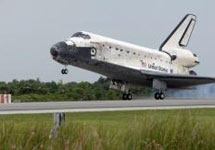 Discovery благополучно приземлился
Discovery благополучно приземлился

Возвращение шаттла Discovery. Фото NASA с сайта Universe Today
Шаттл Discovery совершил благополучную посадку на космодроме на мысе Канаверал. Посадка Discovery произошла, как и было запланировано, в 11.15 по местному времени (19.15 мск).



















Комментарии
Горе то какое у не в меру педриотически озабоченных!
И то, что "неопознаный предмет длинной около полутора футов", замеченный с Дискаверу, скорей всего - отвалившийся блок с МКС - как это переживут местные великодрочеры?
Слава американским покорителям космоса!
!
http://www.economist.com/world/na/displaystory.cfm?story_id=11551744 Worries that America is losing its edge in science and technology are overblown “THE wolves have not encircled us yet,” the Denver Post opined in an article in
2006 entitled “Signs America's Scientific Edge is Slipping”,
“but there's no denying the sounds of scratching at the door.” This was a pithy summary of a mountain of reports from congressional committees, scientific panels and business groups. But a new report from the RAND Corporation's National Defence Research Institute, “US Competitiveness in Science
and Technology”, suggests that the panic is overblown. The report demonstrates that America is still the world's science and technology powerhouse. It accounts for 40% of total world spending on research and development, and produces 63% of the most frequently cited publications. It is home to 30 of the world's leading 40 universities, and employs 70% of the world's living Nobel laureates. America produces 38% of patented new technologies in the OECD and
employs 37% of the OECD's researchers. There is little evidence that America is resting on its laurels, according to RAND. Developing countries such as China and India may be boosting their science and technology muscle faster than America. But they are starting from a low base. America is outperforming Europe and Japan on many performance measures: in 1993-2003 America's growth rate in patents averaged 6.6% a year compared with
5.1% for the European Union and 4.1% for Japan. One reason for America's angst was that the growth of federal spending on R&D slowed significantly with the end of the cold war. It only grew by 2.5% a year in 1994-2004 compared with a long-term average of 3.5% since 1953. The trouble with this statistic is that America has lots of sources of R&D spending: federal money accounted for only $86 billion of the $288 billion that it spent on R&D in 2004. Spending on the life sciences is increasing rapidly, a reasonable bet on the future. Others worry that non-US citizens now account for 41% of science and engineering PhDs. But this is arguably a sign of America's continuing world domination: the world's brightest people are gravitating to the world's best opportunities. A higher proportion than ever of these paragons want to make their homes in the United States.
Анонимные комментарии не принимаются.
Войти | Зарегистрироваться | Войти через:



Комментарии от анонимных пользователей не принимаются
Войти | Зарегистрироваться | Войти через:


